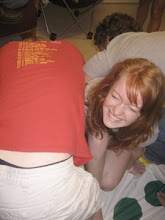I have thoroughly enjoyed my Paideia experience thus far. I was a little worried about the cohort and Dr. G, because I only knew two people prior to the program. Fortunately, our group is incredibly talkative and easy to get to know. I think that a big part of why I’ve enjoyed myself so much is because of the passion of those in the cohort, as well as the conflicting ideas everyone has on EVERYTHING. I love debating, and it’s nice to be in an environment where people are not shy, but rather jump at the chance to discuss and expand on ideas. I think that the only way a person can truly grow academically is through debate and being exposed to different ideas and different ways to view the same idea. Our group has been awesome with that. I also feel that, for the most part, people are respectful in debates, although I know that I at least have gotten a little too animated on occasion. I think that as long as we are all able to remain respectful, the next three years will be so beneficial for everyone.
I’ve really enjoyed our discussions on the Fifty Facts book; I feel that a lot of the issues we’ve talked about are important ones that tend to fly under the radar. Many of them were issues that really could not be brought to light by the media on a large scale, or we (Americans) would really have to start questioning our government and it’s priorities (which is not necessarily a bad thing, but it isn’t gonna happen), like Katie’s discussion on torture. I was also really surprised by the opinions people had on certain issues that contradicted the perceptions of them that I had established- which is awesome.
I’m really excited about our civic engagement at the Boys and Girls Club next semester; I think it will be a great growing experience for all of us. I hope that everyone is on board with it, and will bring enthusiasm to the event. I also hope that this volunteer experience will help change some peoples perceptions of what it means to volunteer and the potential benefits. I’m also glad that we picked an organization that has a good deal of flexibility time-wise.
The only things I would change would probably be that it would be cool to talk more about how the issues we discuss pertain to psychology and Understanding Human Behavior, and also, I have really enjoyed our outside events, and would like to have more… laser tag maybe?
Overall, I have had an extremely positive experience; I have grown academically and personally from this group in a short amount of time. Also, Dr. G is an amazing professor, and always gives a great deal of really interesting perspective on all the issues we talk about in class. I’m excited to see where we go with this cohort, and if we can all help each other grow a little or a lot (corny…sorry).
